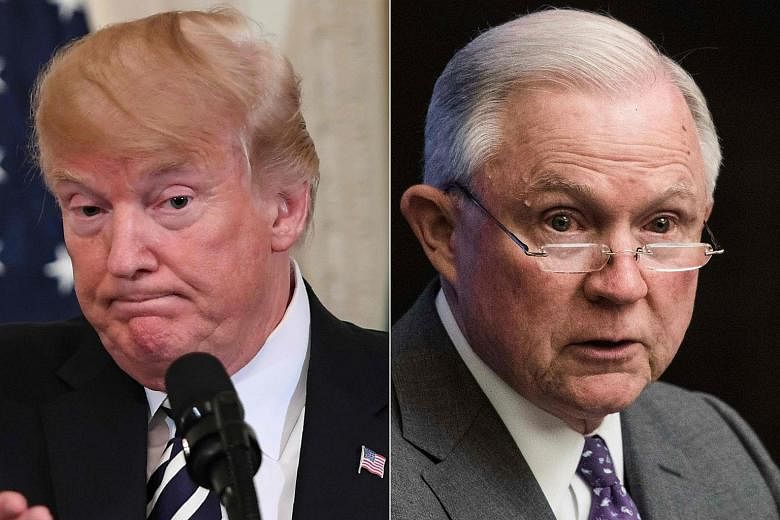WASHINGTON (NYTIMES) - President Donald Trump said on Friday (Sept 7) that he wanted Attorney-General Jeff Sessions to investigate the source of an anonymous op-ed essay published in The New York Times, intensifying his attack on an article he has characterised as an act of treason.
Speaking to reporters on Air Force One as he travelled to Fargo, North Dakota, Trump said, "I would say Jeff should be investigating who the author of that piece was because I really believe it's national security."
Trump said he was also considering action against The Times, although he did not elaborate.
The president has raged against the essay since The Times published it on Wednesday afternoon. His latest remarks indicate that he wants to use the Justice Department to root out the source of the op-ed, which described some administration officials in a state of near mutiny against a president they view as dangerous and untethered from reality.
"We're going to take a look at what he had, what he gave, what he's talking about, also where he is right now," Trump said.
In a statement on Friday, The New York Times said any such investigation would be an abuse of power.
"We're confident that the Department of Justice understands that the First Amendment protects all American citizens and that it would not participate in such a blatant abuse of government power," The Times said. "The president's threats both underscore why we must safeguard the identity of the writer of this Op-Ed and serve as a reminder of the importance of a free and independent press to American democracy."
A spokeswoman said that the Justice Department does not confirm or deny the existence of investigations.
While the president suggested that the anonymous writer was probably not a senior official, he said the person might nonetheless have a security clearance that allowed him or her to attend sensitive meetings on China, Russia or North Korea.
"I don't want him in those meetings," he said.
Trump also escalated his attack on a new book by Bob Woodward, describing it as a "total fraud" and arguing, "I don't talk that way." The president said libel laws should be toughened to go after Woodward for what Trump claimed was a pattern of falsehoods.
"Our libel laws are pathetic," Trump said. "Our libel laws should be toughened up so that if somebody writes things that are fraudulent and false, they get sued and they lose."
Trump singled out an episode in the book in which Woodward reported that Gary Cohn, his chief economic adviser at the time, removed a piece of paper from his desk that would have directed the United States to withdraw from a trade agreement with South Korea.
"He never took a memo off my desk," the president said. "Gary Cohn, if he ever took a memo off my desk, I would have fired him in two seconds. He would have been fired so fast."
For all his criticism of the anonymous essay, Trump was caught up in the same guessing game that has riveted much of Washington. He speculated that the source could not be very high-level because a long list of Cabinet members and other ranking officials had denied writing it.
The Times' editorial page department identified the writer as a "senior administration official."
"It would be very hard if it was," he said, "if they got caught."
Trump said he was open to the idea of administering lie detector tests to members of his staff to determine the identity of the source. But he added, "Eventually the name of this sick person will come out."
After a week of damaging disclosures, Trump has struggled to contain a narrative describing an out-of-control administration, insisting that the White House was a well-oiled machine and blaming the appearance of disarray on a vengeful and corrupt news media.
At a rally on Thursday night with supporters in Billings, Montana, he complained how The Times' editorial page department had granted anonymity to the writer of the op-ed.
"You can't discredit because you have no idea who they are," Trump said. "It may not be a Republican, it may not be a conservative. It may be a deep state person that's been there a long time."
"It's a very unfair thing," he said, "but it's very unfair to our country and to the millions of people that voted really for us."
The essay described the existence of an internal resistance throughout the bureaucracy, composed of Republicans who support many of the president's policy goals but regard him as a threat to the nation's safety and security. Many of these officials in the administration were "working to insulate their operations from his whims," the op-ed author wrote.
"Meetings with him veer off topic and off the rails," the article said, "he engages in repetitive rants, and his impulsiveness results in half-baked, ill-informed and occasionally reckless decisions that have to be walked back."
It also said that Trump "shows a preference for autocrats and dictators, such as President Vladimir Putin of Russia and North Korea's leader, Kim Jong Un, and displays little genuine appreciation for the ties that bind us to allied, like-minded nations."
On Thursday in Montana, Trump cited his meetings with Putin and Kim as evidence of his competence and success.
He said Kim had sent him a personal letter, which he expected would be positive and could jump-start nuclear negotiations with the North.
"He says, 'I have respect for President Trump,'" the president said.

